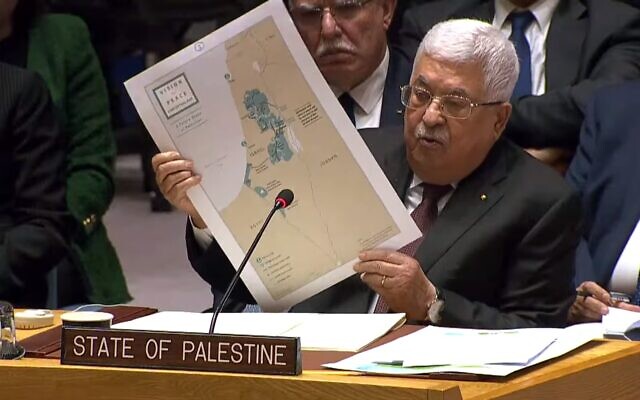Process may take years, but officials and analysts accusing Israel of killing option for future Palestinian state have started calling for a unitary state with equal rights for all
By RAPHAEL AHREN, TOI

Illustrative: Palestinian officials along with Israeli and International peace activists plant trees near Beit Al Baraka compound as part of a protest against the land being taken over by Israeli settlers on April 9, 2016. (Wisam Hashlamoun/Flash90)
For years, Israeli officials have insisted that reports of the death of the two-state solution are greatly exaggerated, and that the option of a Palestinian state is still alive, despite ongoing settlement expansions.Now, many proponents of a two-state solution are worried that Israel’s planned unilateral annexation of large parts of the West Bank would bury that possibility once and for all.
Advocates of an Israeli annexation, on the other hand, say the move, if carried out in accordance to the US peace plan, would actually advance a “realistic two-state solution.”Either way, an Israeli annexation as envisioned by the deal of the century is likely to erode the international consensus behind the two-state paradigm, and may cause the world to start backing the idea of a unitary state in which Israelis and Palestinians enjoy equal rights.“Annexation will end the debate about Israel’s borders. It will also start a debate on a one-state outcome,” posited Evan Gottesman, the associate director of policy and communications at the Israel Policy Forum, a dovish think tank based in the US, on Wednesday.
How one assesses the fallout of a possible annexation, which Prime Minister Benjamin Netanyahu seeks to advance this summer, depends to a large extent on one’s politics: right-wingers dreaming of Greater Israel are convinced that the sky will not fall, while doves in favor of territorial concessions and Palestinian statehood argue that it would the beginning of the end of the Zionist project.
Advocates of annexation predict very little will change. An assertive Israel, they argue, can easily weather the international opprobrium, which they expect to fade away quickly just like the world eventually forgot about Israel’s annexations of East Jerusalem and the Golan Heights.

Prime Minister Benjamin Netanyahu, left, US Ambassador to Israel David Friedman, center, and Tourism Minister Yariv Levin during a meeting to discuss mapping extension of Israeli sovereignty to areas of the West Bank, held in the Ariel settlement, February 24, 2020. (David Azagury/US Embassy Jerusalem)
Critics, by contrast, anticipate not only condemnations but sanctions, and not only from Europe but also from 50 percent of the American body politic. They also worry about further alienating Diaspora Jewry, fear for the peace agreement with and the internal stability of Jordan, fret over the recent rapprochement with the Gulf states, and predict increased wrath from the International Criminal Court.
Some have argued that the plan will make a future separation from the Palestinians nearly impossible in the long run, which eventually would turn Israel into an apartheid state in which Israelis and Palestinians share the same space but have unequal rights.
One counterargument is that the currently envisioned annexation — which the Israeli government agreed would only occur in full coordination with the US administration and along the lines of President Donald Trump’s peace proposal — would apply Israeli sovereignty to about 30 percent of the West Bank.
The rest remains reserved for a future Palestinian state — hence, in this thesis, annexation in the framework of the plan would not presage the end of the two-state solution but rather be a step toward a “realistic two-state solution.” Indeed, the so-called deal of the century mentions the term “two-state solution” a whopping 86 times.

Palestinian Authority President Mahmoud Abbas speaks to the UN Security Council on February 11, 2020. He is holding a map included in the US proposal for Israeli-Palestinian peace, which he said he rejected and whose application on the ground would be “confronted” by the Palestinians. (UN screenshot)
But rather than embracing the plan as an outline to reach a two-state solution, many in the international community consider it the final nail in the coffin of a two-state solution. And while few officials are currently ready to depart from the decade-old diplomatic dogma sanctifying the two-state solution, there are growing indications that sooner or later they will embrace a one-state outcome.
Because once the world determines that the old “two states for two peoples” paradigm is no longer relevant, it will likely draw the logical conclusion and start advocating for one bi-national state, from the Mediterranean to the Jordan River, with equal rights for all.
“We agree that the annexation of the Jordan Valley would mean the end of the two-state solution,” European Union foreign policy chief Josep Borrell said on April 30 after speaking to Jordanian Foreign Minister Ayman Safadi.
If annexation kills all prospects for a Palestinian state next to Israel — then what’s the alternative?
For now, most governments cling to the two-state doctrine, which has been affirmed as the “best and the only realistic chance for peace” in countless resolutions and declarations. But some officials have started saying the hitherto unthinkable.
The dream [of Israel] was not based on the dogma of a two-state solution. It is therefore time to revive the idea of the coexistence of all in one common state
“The principle of ‘two states for two people’ was the motto and official condition of the peace process. Let’s face it, time is running out and the situation has changed,” Radek Vondrá?ek, the speaker of Czech Republic’s Chamber of Deputies, wrote Monday in an op-ed. The world, he added, should not force its “old schemes and the frustration that results from not fulfilling them” on the parties on the ground if they want to explore new ideas.
“The existence of the state of Israel shows that the realization of the human dream of freedom is extremely difficult,” Vondrá?ek wrote. “The dream was not based on the dogma of a two-state solution. It is therefore time to revive the idea of the coexistence of all in one common state.”
As opposed to Vondrá?ek — who is known as a friend of Israel — even those critical of the Israeli government say annexation would make any other outcome impossible.
“This decision will kill the two-state solution, making a one-state solution inevitable,” Safadi, the Jordanian foreign minister, said Wednesday.

Palestinian chief negotiator and Secretary General of the Palestine Liberation Organization (PLO) Saeb Erekat (R) is greeted by Jordanian Foreign Minister Ayman al-Safadi upon his arrival at the Foreign Ministry in the Jordanian capital Amman on May 14, 2017. (AFP PHOTO / Khalil MAZRAAWI)
“Right now, the two-state solution is dead… Wouldn’t it be great if we actually had a democratic state for Jews and Palestinians between the river Jordan and the Mediterranean?” Irish member of the European Parliament Mike Wallace asked Borrell this week.
Earlier this month, dovish Israeli columnist Gideon Levy endorsed annexation as “the only way out of the deadlock, the only possible shake-up that could end this status quo of despair we’ve gotten stuck in, which can no longer lead anywhere good.”
“Maybe,” responded Nick Westcott, the former director of the EU’s Middle East department. “But only as part of a coherent one-state solution with equal rights for all citizens.”
Nick Westcott@NickWestcottRAS
Maybe. But only as part of a coherent one state solution with equal rights for all citizens. https://twitter.com/Rob_Malley/status/1259603976741359617 …
Robert Malley
Gideon Levy once more counters conventional wisdom:
“Annexation has always been presented as mother of all disasters, but we have to stop fearing it. It is shaping up as the only way possible shake-up that could end this status quo of despair” https://www.haaretz.com/opinion/.premium-let-israel-annex-the-west-bank-it-s-the-least-worst-option-for-palestinians-1.8833755 …
Ramallah has long threatened to abandon its quest for statehood and to seek equal rights for Palestinians instead if Israel continues to encroach on the territory they claim for their state. Jerusalem routinely dismisses such threats, despite opinion polls suggesting that especially younger Palestinians are receptive to a one-state solution.
Dan Shapiro, a former US ambassador to Israel and now a fellow at Tel Aviv University’s Institute for National Security Studies, agrees that annexation could give Palestinians further impetus to push a one-state solution, and that this will eventually have an impact on the international community’s position on the matter.
“Most [young Palestinians] say, you know what, if two states is impossible, what we just really want is the rights of citizenship. And they’d be happy to pursue those rights in a one-state scenario and again, seeing a unilateral annexation executed I think would very much strengthen that trend,” he told the Israel Policy Forum in a briefing last month.
“It may be five years or ten years or 15 years, but I think that a lot of countries including a lot of the Arab states who are quite friendly to Israel and other countries as well, certainly in Europe and in other places, would over time drift in the direction of advocating for that,” Shapiro said.
“They would say, you know what, if two states is impossible, here’s an alternative, where everyone would have the right to vote and representation in a parliament, one democratic state between the Mediterranean and the Jordan River.”
Hugh Lovatt, a policy fellow at the European Council on Foreign Relations focusing on the Middle East process, said the EU “should acknowledge that the two-state logic that has underpinned its own policies for the last three decades may no longer hold.”
We don’t see any alternative to the two-state solution, because we feel that Israelis would like to have their own state in which the Jews are a majority. And a one-state solution is not compatible with this desire
Lovatt called for a “broad policy review” to assess the demise of the two-state paradigm. “Most fundamentally, though,” he added, “the EU and its member states should be clear that if a two-state solution is no longer a viable option, then the only alternative acceptable means of achieving equal rights for both peoples will be through a bi-national state.”
Want to remain a Jewish state? Not our problem, the world will say
Diplomats and politicians have also been pushing for a two-state solution because, they say, there is no other option that would both safeguard Israel as Jewish state and as a democracy.
“We don’t see any alternative to the two-state solution, because we feel that the Israelis would like to have their own state in which the Jews are a majority and where they can live their own identity. And a one-state solution, to us, is not compatible with this desire, which is understandable,” EU Ambassador to Israel Emanuele Giaufret said in a December 2017 interview with The Times of Israel.
But most of the international community never really understood, let alone endorsed, Israel’s desire to be recognized as a Jewish state. And if Israel is seen as single-handedly killing the two-state solution by unilaterally annexing a third of the West Bank, the world may just decide that what it really cares about is democracy and human rights.
Israel cannot have it all: obstruct the creation of Palestinian state, maintain a Jewish majority and be considered a democracy. And since Israel has apparently decided to make a future separation from the Palestinians impossible, it will have to choose between being Jewish or being democratic, the world can be expected to argue.
The idea of ethnocentric nation-states has long been out of fashion in Europe, and if Ramallah were to decide down the line to abandon its quest for statehood and demand Israeli citizenship for all West Bank Palestinians instead, many in the international community will likely find no reason to object.



Jewish and Democratic, to me, means a state of the Jews, by the Jews, and for the Jews, and love it or leave it. End of story.
While some of my right wing friends cry that the Trump Plan mentions a very limited Pal State if they agree to about 10 different conditions that they will never happen, the left has another view. They fret this is the end of the two state solution because as they correctly assert the Pal-Arabs will NEVER AGREE to the things required of them to become a demilitarized Statelet under Israeli Security in all their territory.
So will there be a movement calling for a one state with equal rights including voting rights for people living from the river to the sea?